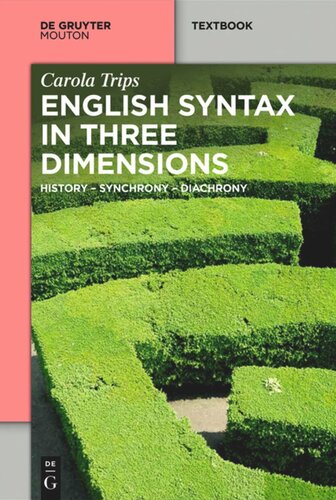

Most ebook files are in PDF format, so you can easily read them using various software such as Foxit Reader or directly on the Google Chrome browser.
Some ebook files are released by publishers in other formats such as .awz, .mobi, .epub, .fb2, etc. You may need to install specific software to read these formats on mobile/PC, such as Calibre.
Please read the tutorial at this link: https://ebookbell.com/faq
We offer FREE conversion to the popular formats you request; however, this may take some time. Therefore, right after payment, please email us, and we will try to provide the service as quickly as possible.
For some exceptional file formats or broken links (if any), please refrain from opening any disputes. Instead, email us first, and we will try to assist within a maximum of 6 hours.
EbookBell Team

4.4
12 reviewsThis book deals with syntax in three dimensions: in part I with the history of grammatical theory, in part II with synchronic aspects of Present-Day English, and in part III with diachronic aspects of English. The most prominent linguistic terms and phenomena are discussed in their historical context and are taken up again in the synchronic and diachronic parts. In this way they can be viewed from different perspectives.
At the end of each chapter a summary and recommendations for further reading is provided as well as exercises in parts II and III. There is also a webpage for this book with more material, a glossary, and model answers of the exercises. The aims of the book are 1) to provide an introduction to the history of grammatical theory in order to show how and why generative grammar evolved (alongside other theories); in this way, generative grammar is presented in its historical context, and the motivation for the ideas and assumptions of this theory becomes clear; 2) to show that the terms and phenomena discussed are still applicable and interesting today; 3) to investigate phenomena of Present-Day English and their development in the history of English by means of authentic data, and to find explanations for the developmental paths they took by applying theory.
This book primarily aims at undergraduate students of English or linguistics who have already acquired some knowledge of syntax and generative syntactic theory. It is also well suited for students specialising in syntax, syntactic theory, and language change. It can further be used as a study aid for final exams.